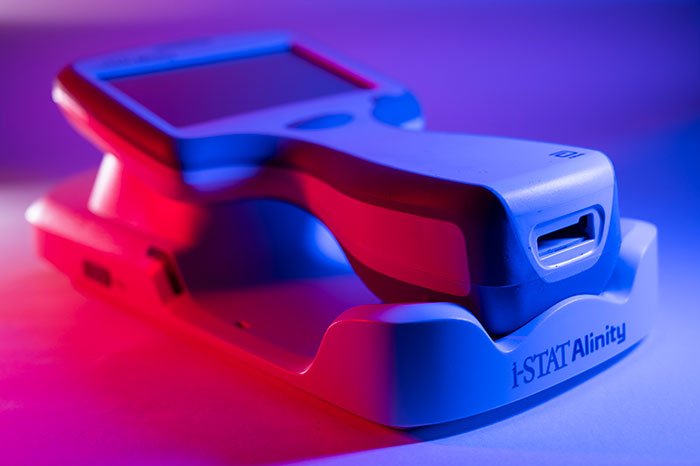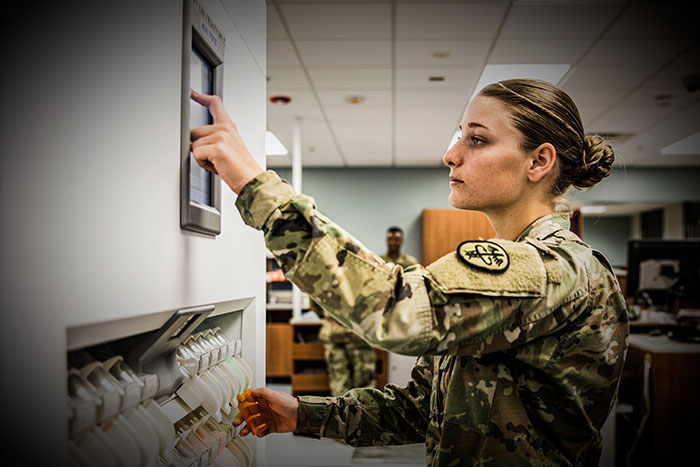Brain health diagnostics, treatments a focus for Army medical developers

The brain is a delicate, complex organ. It drives executive functions, controls physiological processes, moderates emotions, and serves as a data bank for the human experience. During combat operations, U.S. servicemembers don gear like body armor, ballistic eyewear, gloves, and gas masks to protect their bodies, while medical personnel serve to treat and heal Warfighters injured and wounded during training and operations. But the effects of direct brain trauma caused by concussive blasts, or the consequences of enduring a traumatic experience, can be lifelong and sometimes debilitating. Traumatic brain injuries and post-traumatic stress disorder are not always immediately apparent at the front lines, nor easily treatable once a servicemember returns home.
To counter the effects of brain injuries and provide treatment options across the continuum of care for military medical providers, development teams with the U.S. Army Medical Materiel Development Activity are working to find modern solutions for treating the complex brain injuries that occur during modern conflicts. The Warfighter Readiness, Performance, and Brain Health (WRPBH) Project Management Office is home to development professionals who focus on assessing, diagnosing, and treating brain injuries, with the goal of providing frontline medical personnel the tools to begin the treatment process almost immediately post-injury, according to Lou Jasper, WRPBH project manager.
"Brain injury treatments are a huge focus for the Department of Defense. Traumatic Brain Injuries have serious and sometimes long-term impact on the lives of our servicemembers and Veterans," said Jasper. "Brain injuries can cause both cognitive and behavioral issues impacting servicemembers' readiness and their ability to return to the fight. Additionally, our Veterans may struggle with long-term issues that affect their health and well-being.
"The WRPBH PMO is committed to our mission of developing TBI and behavioral health medical solutions for our servicemembers on two fronts. For TBI, we have programs that address the needs of our Warfighters in the field, to prevent, mitigate, assess, and treat TBIs. For behavioral health, we are focused on providing assessment and treatment solutions for post-traumatic stress disorder and acute stress."
USAMMDA and WRPBH do not work alone. Though based at Fort Detrick, Maryland, their teams connect with brain research and technical experts across the United States and the world to build a network of health care and development professionals dedicated to finding modern assessment and treatment solutions for America's Warfighters, according to Jasper.
"We work with DoD stakeholders in our sister services, government agency and industry partners, research experts in academia and our government laboratories, and volunteers from the active-duty military forces to refine our focus and build our portfolio to address the challenges our Warfighters may face in the future," said Jasper. "This comprehensive approach is critical. It helps to ensure that we fully understand all the variables and ensure that we meet the needs of our end users and our most important customers: our active-duty military and Veterans."
A new approach to PTSD drug treatment
The WRPBH development teams have several lines of effort to address the current and future needs of both the military and Veteran communities. During 2023, WRPBH launched a groundbreaking clinical trial to explore the promise of new drug treatments for post-traumatic stress disorder (PTSD).
Roughly six percent of the U.S. population will have PTSD at some point in their lives, with military members and Veterans having a higher rate of diagnosis, according to the National Center for PTSD. People with PTSD have difficulty recovering after experiencing or witnessing a traumatic event. The condition may last months or years, with triggers that can bring back memories of the event, accompanied by intense emotional and physical reactions. Symptoms may include nightmares, avoidance of certain situations, heightened stress reactions, anxiety, and depression, according to the National Institute of Mental Health.

The multi-site trial managed by WRPBH includes representatives from the U.S. Air Force, Navy, Army, and Special Operations communities. Results from the clinical testing may have far-reaching impact on treatment options for PTSD in the military, Veteran, and civilian health care systems, according to Kimberly Del Carmen, Ph.D., a health science product manager with WRPBH.
"PTSD is heterogenous in nature, meaning that no single biological cause is common to all individuals with PTSD," said del Carmen. "For that reason, we don't think there will be one 'magic pill' that will work for everyone, so we're employing an innovative testing strategy called an Adaptive Platform Trial."
This clinical trial platform design allows for an efficient use of resources with an accelerated schedule in which multiple drugs are simultaneously and sequentially tested. As the trial progresses, drugs that fail will be replaced with new candidates, and those that are successful will "graduate" to the next stage of development.
Since 1987, more than 130 PTSD pharmacotherapeutic trials have been conducted, but only two drugs (paroxetine and sertraline) are approved by the Food and Drug Administration (FDA) specifically to treat the condition. Although other drugs can be prescribed "off-label," meaning they are FDA-approved for other medical conditions, there is scant data to guide such use in the military population, according to del Carmen.
Drugs tested in the future are likely to be novel drugs, since the goal of this effort is to obtain FDA approval of one or more therapeutics for the treatment of PTSD, del Carmen said.
The trial will include 15-20 clinical sites within the United States and is planned to include up to 600 subjects during the testing of the first three drugs over approximately three years.
Blood test as TBI assessment tool for front line providers
In addition to PTSD treatment research, the WRPBH team is working to develop and field clinical devices for use by U.S. Warfighters at and near the front lines. In partnership with industry and DoD stakeholders, WRPBH is focusing on a handheld assessment tool, the Analyzer Traumatic Brain Injury device, for identifying biomarkers in blood samples taken from servicemembers with suspected traumatic brain injuries. The i-STAT Alinity plasma TBI (developed by industry partner Abbott Point of Care Inc.*) is the first FDA-cleared blood test of its kind that is commercially available for health care systems in the United States. The test is designed for clinical, non-military uses to provide objective data regarding the presence of TBI.
"The ATBI is a fast and effective FDA-cleared assessment device that can give theater-based medical providers near real-time test results to make treatment decisions," said Bobbie Mortimer, deputy project manager with WPRBH. "[Our] team forecasts fielding and integration of the technology in 2025. While the test alone does not diagnose TBI nor quantify TBI severity, it does provide valuable information regarding the presence or absence of markers in the blood that may indicate brain injury."
The U.S. Army and the Joint Force continue to focus on modernization and preparing for future conflicts in places like the Arctic and Indo-Pacific regions of the world. Austerity, dispersed logistics lines, contested communications, and unpredictable weather at both ends of the meteorological spectrum will make assessment and treatment technologies designed for frontline use vital to field commanders. Traumatic brain injuries are complex and successful treatment outcomes are often time-dependent, with each hour adding to the likelihood of negative long-term effects caused by brain trauma. Devices like ATBI are designed to increase frontline commanders' options for triaging seriously injured and wounded servicemembers while increasing the availability of patient data to inform immediate treatment and medical evacuation priorities.
"The results of the ATBI test, along with other clinical data, will improve triage and evacuation priorities during dispersed operations and inform treatment at higher echelons of care once a casualty is moved," said Mortimer. "The ATBI is portable, user-friendly, reliable, and accurate, and it gives frontline medical providers a needed edge in providing medical care in austere locations, where every minute counts to save lives and preserve combat strength."
USAMMDA is the DoD's premier developer of world-class military medical capabilities. Located at Fort Detrick, Maryland, USAMMDA develops, delivers, and fields critical drugs, vaccines, biologics, devices, and medical support equipment to protect and preserve the lives of Warfighters across the globe.
*The laboratory assay for TBI point-of-care biomarker effort has been funded by the U.S. Army and is managed by WPRBH developers – no endorsement is made or implied.













